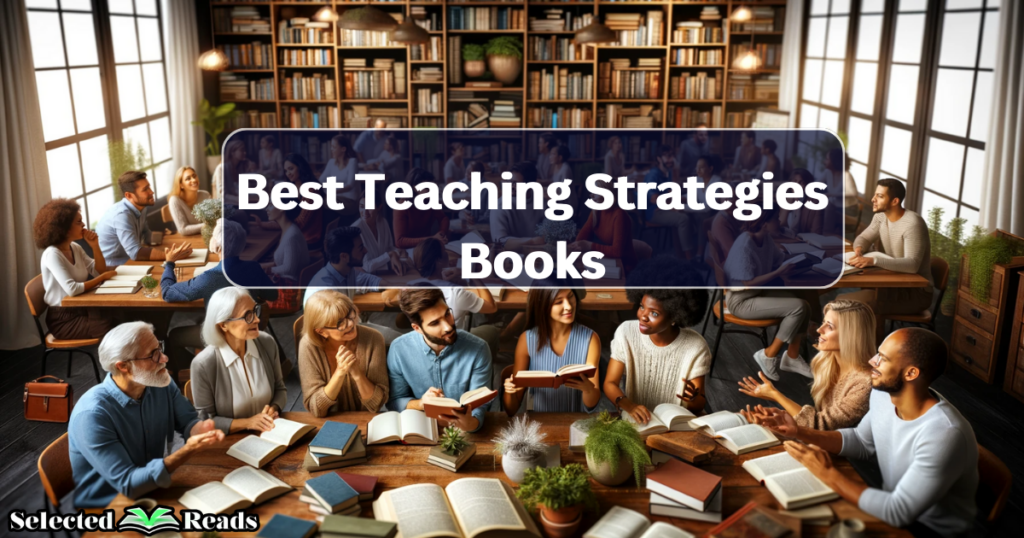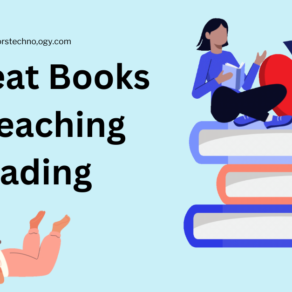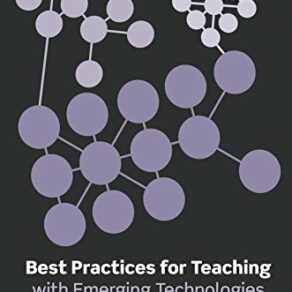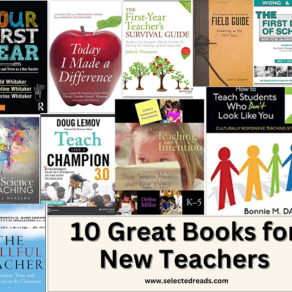
As educators, we are constantly seeking ways to improve our teaching practices and create the most engaging, effective learning experiences for our students. Whether you are a seasoned teacher or just beginning your career, staying current with the latest research, tools, and strategies is essential for fostering student success.
With that in mind, I have compiled a list of must-read teaching strategies books that will not only inspire you, but also equip you with practical techniques and approaches to enhance your classroom instruction. These books cover a wide range of topics, from differentiated instruction to evidence-based practices and innovative teaching models, ensuring that you can find the perfect resource to support your professional growth.
For more books on teaching check out:
Teaching Strategies Books
Here are some key teaching strategies books to add to your reading list:
1- How to Differentiate Instruction in Academically Diverse Classrooms , by Carol Ann Tomlinson
This expanded 3rd edition by Carol Ann Tomlinson serves as a practical guide for teachers, covering the fundamentals of differentiation and providing new strategies and guidelines.
The book emphasizes the importance of differentiation in education and offers advice on setting up a flexible learning environment, managing a differentiated classroom, and planning lessons based on readiness, interest, and learning profiles. The book also covers how to differentiate content, process, and products while preparing students, parents, and teachers for the challenges of differentiation.
2- Effective Instructional Strategies: From Theory to Practice, by Kenneth D. Moore
Kenneth D. Moore’s third edition of Effective Instructional Strategies offers a comprehensive examination of essential teaching strategies and skills, emphasizing the intelligent use of teaching theory and research to improve classroom instruction.
The book presents a Theory to Practice approach, applying the latest research findings and practical classroom practices to the instructional process. Designed to expand teachers’ pedagogical knowledge and repertoire, the text provides information on how to become an effective classroom teacher in a logical and precise manner.
3- The New Art and Science of Teaching , by Robert J. Marzano
Robert J. Marzano’s expanded volume of The New Art and Science of Teaching focuses on student learning outcomes, presenting a competency-based education framework based on 50 years of education research.
The book details three overarching categories of teaching: providing students with feedback, delivering meaningful content instruction, and meeting basic psychological needs. It features research-based instructional strategies that teachers can use to enhance students’ understanding of the information and skills they are taught.
4- Differentiated Instructional Strategies: One Size Doesn′t Fit All, by Gayle H. Gregory, Carolyn M. Chapman
The third edition of Differentiated Instructional Strategies, by Gayle H. Gregory and Carolyn M. Chapman, serves as a comprehensive resource for implementing differentiated instruction in the classroom.
It features a deep research base, immediately useable examples, a start-to-finish six-step process, and an emphasis on formative assessment. The updated edition includes a Common Core lesson-planning template, 70+ templates, tools, and questionnaires, and a larger format, making it an even richer resource for educators.
5. Teach Like a Champion 3.0, by Doug Lemov
Updated with the latest techniques and findings in cognitive science, this guide by Doug Lemov is indispensable for anyone looking to create a positive and productive learning environment. Whether you’re a new teacher or an experienced educator, you’ll find valuable tips on how to encourage student engagement, accountability, and excellence.
Teach Like a Champion 3.0 also includes an expanded video collection that will help you see the techniques in action and put them into practice in your own classroom. With this book, you’ll be able to build students’ background knowledge, move learning into long-term memory, and connect your teaching with the standards-aligned curriculum for tangible results.
6.The Skillful Teacher: On Technique, Trust, and Responsiveness in the Classroom, by Stephen D. Brookfield
The Skillful Teacher is a practical guide to effective teaching techniques, approaches, and methods for college classrooms. Stephen Brookfield, a college professor for over 40 years, provides insights, reflections, and advice on how to keep your teaching and students energized. The book is adaptable to online teaching, working with diverse student populations, and inclusive classrooms.
7. Understanding by Design, by Grant Wiggins and Jay McTighe
Understanding by Design introduces a powerful and practical framework known as “backward design” for planning curriculum, instruction, and assessment. Grant Wiggins and Jay McTighe argue that teachers should first identify the desired learning outcomes and then design instructional activities and assessments to achieve those goals. The book provides guidelines, examples, and templates to help educators develop curricula focused on promoting deep understanding and transfer of knowledge.
8. Visible Learning for Teachers: Maximizing Impact on Learning by John Hattie
In Visible Learning for Teachers, John Hattie synthesizes over 15 years of research involving millions of students to reveal what truly works in education. The book highlights the importance of understanding the impact of teaching on student learning and provides evidence-based strategies for effective instruction. Hattie offers a framework for lesson planning, feedback, and evaluation, empowering teachers to maximize their impact on student achievement.
Find it: Amazon
9.The First Days of School: How to Be an Effective Teacher, by Harry K. Wong, Rosemary T. Wong
The First Days of School is a classic resource for new and experienced teachers, focusing on essential strategies for establishing a successful classroom environment from day one. Harry K. Wong and Rosemary T. Wong provide practical advice on classroom management, lesson planning, and building positive relationships with students. The book features real-life examples, illustrations, and checklists to help teachers create a strong foundation for a successful school year.
10. The New Classroom Instruction That Works,by Bryan Goodwin et al
The New Classroom Instruction That Works presents 14 research-based instructional strategies that foster deep, meaningful, and long-lasting learning. These strategies, which are complementary and effective, are organized within a framework designed for instructional planning and in alignment with how the brain learns.
For each strategy, the book provides key research findings, essential principles of classroom practice, and recommended approaches for implementation with modern learners. Both new and experienced teachers will benefit from this resource, gaining a deeper understanding of effective teaching and how it enhances student achievement, as well as practical insights on what to do, when to do it, and why.
11. The Art of Teaching, by Gilbert Highet
The Art of Teaching is a classic work that explores the techniques, challenges, and joys of teaching. Highet emphasizes the importance of cultivating a deep understanding of subject matter, along with strong communication and interpersonal skills to inspire and engage students.
Drawing from his own experiences and the wisdom of great teachers throughout history, Highet offers practical insights and advice on various teaching methods, classroom management, and the role of humor in education. This timeless book remains a valuable resource for both new and experienced educators, emphasizing the artistry and craftsmanship involved in shaping the minds of future generations.
12. Highly Effective Teaching Strategies, by Marc Hoberman
This guidebook offers practical advice and strategies for both new and experienced teachers on lesson planning, classroom management, and more. Drawing from over 30 years of teaching experience, Hoberman provides a fun, interactive, and dynamic approach to maximize success in the classroom.
13. Teaching with Love & Logic, by Jim Fay and Charles Fay
This book provides teachers with exercises and tips to establish a classroom environment based on shared control, choices within limits, and strong relationships. It focuses on internalizing discipline in students and offers guidance for easier classroom management and more effective teaching for grades K-12.
Find it: Amazon
14. Instructional Strategies for Effective Teaching, by James H. Stronge and Xianxuan Xu
This practical guide showcases research-based instructional strategies to improve student learning and success. Covering 10 methods of instruction, it helps educators deepen their understanding of classroom discussions, concept mapping, inquiry-based learning, and more.
15. Teaching Strategies: A Guide to Effective Instruction, by Donald C. Orlich et al
Now in its eleventh edition, this book provides comprehensive coverage on commonly used classroom teaching strategies and tactics, including lesson planning, questioning, and cooperative learning. With updated material on technology integration, English Language Learner instruction, and proactive classroom management, it is an ideal resource for education students and professionals.
Final thoughts
Reading through this compendium of teaching strategies books feels like a treasure hunt for pedagogical wisdom. What makes it fascinating is that each book acts as a mentor in its own right. From differentiation to classroom management, to evidence-based practices and so on—each offers its own blend of theory and practicality that you can actually see yourself using in the classroom.
I’m reminded of the times I delved into books to rescue my lessons from becoming monotonous and to ignite that spark in my students. You know what they say: Teachers are eternal learners, and these books make sure that flame never goes out.





















